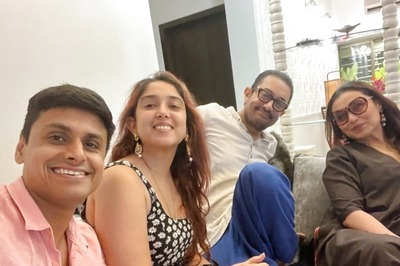
views
BANGALORE: As the sun rises and sets over the horizon, the Puttenahalli Lake in JP Nagar sparkles with new hope. In 2008, she was inching towards a waterless death. But thanks to the observant eyes of Usha Rajagopalan and her friends, she now stands pretty optimistically, with enough water to show off her shimmering elegance and flora and fauna occupying the places that once used to be the dumping ground for bricks and debris.The Puttenahalli Neighbourhood Lake Improvement Trust (PNLIT) signed an MOU on May 17 with the BBMP to maintain Puttenahalli Lake. This makes them the first residents group of Bangalore to take charge of maintaining a lake.It was in January 2008 that Usha Rajagopalan who lives in L&T South City, an apartment adjoining the lake joined hands with friends from her apartment and formed Save Our Lake, a team that first informed the MLA and the BBMP about the lake’s sad plight. Says Usha, “I came to Bangalore in 2006. I used to look out of the window and see the disappearing lake. I knew we had to do something.” They approached MLA M Krishanppa and told him about the lake that was becoming a dumping ground for construction materials and garbage. After a while, the BBMP began the fencing work. In June 2010, Usha and three others from Brigade Millennium — Arathi Manay, Prasanna K Vynatheya and O P Ramaswamy came together as the first trustees of the PNLIT, registered under the Trust Act of the Government of Karnataka. Now there are seven members in the trust.The MOU spells out joint responsibilities for both the BBMP and the PNLIT. “The BBMP is doing their bit. So are we. We collect funds from the residents of the area and pay the gardener and the sweeper. We also planted 300 trees around the lake. The MOU makes provision for employing a security guard as well. So far, the PNLIT has collected about one lakh rupees,” points out Usha. Work is still going on in and around the lake. Phase I covered desilting, raising the side of the lake, constructing a 1.1 kilometre walking track around the lake and building the outer fencing. Phase II that is under way has quite a lot of work. “We are building a gazebo, toilet, security cabin, an inner fencing and also covering the open culvert,” says Satish B V, the chief engineer of the BBMP.“We want the people around the lake to be involved with it. Also, the Government might take a long time to implement certain measures because of the cumbersome processes. This joint effort is a much quicker way to deal with issues,” he adds.What is left to be addressed is the interlinking of inlets to the Storm Water Drains (SWD). “There are already inlets. It’s a matter of connecting it to the SWD. Next week, I will visit the area with the Chief Engineer of the Bangalore Water Supply And Sewerage Board. We are planning to build an underground sewage system in the area,” points out Satish.PNLIT has a website dedicated to informing the people about its activities. “We want people to know where their money is going,” signs off Usha.Changing handsThe BBMP is planning to hand over a few lakes in the city to the Bangalore Chapter of United Way, an NGO. They have identified eleven lakes in areas like Peenya, KR Puram, ITPL, Whitefield, Hebbal, Yelahanka, Sarjapur Road and Electronic City. “The NGO will identify people in the locality who can take care of the lake,” says Satish B V, BBMP, Chief Engineer. Four months ago, Chinnappanahalli Lake was handed over to Siemens Information Systems Ltd after an MOU was signed between the BBMP and Siemens Information Systems Ltd. “Amblipura Lake on Sarjapur Road is also taken care of by the residents now,” notes Satish.PNLIT’s other initiativesPNLIT is not only concerned about the lake.“It’s looking out for the betterment of the neighbourhood,” says Usha.They are planning to make specific interventions to boost the economy of the area, and to promote the small businesses there.When the ban on thin plastic bags was announced, some of the shops on Puttenahalli Road had approached PNLIT members for the supply of cloth bags.That’s when the idea of making cloth bags came about. PNLIT has employed women from Puttenahalli to make cloth bags priced at Rs 15, Rs 20 and Rs 40, depending on the size. These bags are supplied to various shops in the area.PNLIT is also planning to create educational programs to spread awareness on social and economic concerns in the neighbourhood. They frequently hold classes on vermi composting and mulching.They also plan to build energy efficient lighting in the future.




















Comments
0 comment